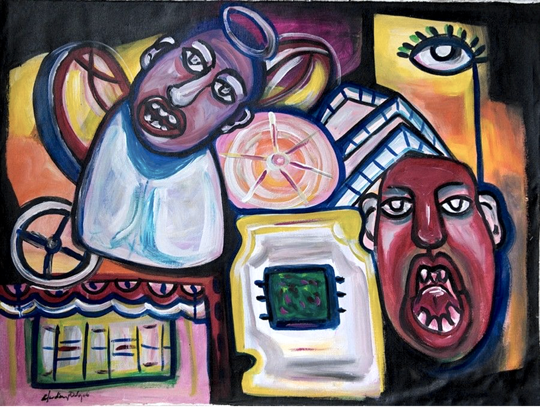Humanity of the Saints
Humanity of The Saints
by Michael Junkroski
Psalm 31.23-24:
All you who are faithful, love the Lord! The Lord protects those who are loyal, but pays the proud back to the fullest degree. All you who wait for the Lord, be strong and let your heart take courage.
Psalm 148:14
God raised the strength of his people, the praise of all his faithful ones—that’s the Israelites, the people who are close to him.
Today is All-Saint’s Sunday, and this year I’ve been wondering, just what is a saint? Someone who does good things? We all do good things now and then, I would hope. Many people dedicate their entire lives to doing good things. If being a saint means doing good things, then how many good acts does it take to become a saint? I’m asking for a friend.
What is a saint? Someone who lives a life of sacrifice? How much sacrifice? Mother Theresa type sacrifice, Pope Francis style sacrifice, or not-eating-fish-on-Friday sacrifice? Martin Luther sacrifice or Jesus sacrifice? Does any sort of sacrifice qualify one for sainthood? In that case, congratulations, parents, we’re all saints.
Saints conjure images of piously perfect people. That image is reinforced by dictionaries that define a saint as someone who is “distinct because of their special relationship with God”—Moses, or Joan of Arc, for example. Saints are special. A saint’s heroic deeds are memorialized in illuminated stained glass windows of ancient, mystery-filled cathedrals. Yet, all the saints—including Jesus—were human. In some cases, their saintly being only developed after a lifetime of hedonistic (Augustine), sometimes sociopathic (Saul’s relentless pursuit of Jesus’ followers) behavior.
My all-time favorite reformed hedonist is St. Augustine, or as I like to call him, the man who destroyed Christianity.
In his autobiographical Confessions, Augustine recalls the significant portion of his life when the theft of a Pear begins a downward spiral of debauchery, licentiousness, and gambling. Augustine wrote that he often committed these acts merely because they were considered “wrong.” He didn’t really want the Pear, he just wanted to take it because stealing was forbidden.
Augustine concluded that his character was inherently flawed. He then decided we must all be inherently flawed because after all, none of us can resist the temptation to do something forbidden. Augustine used the story about Adam and Eve eating from the Tree of the Knowledge of Good and Evil as the root cause of all our bad behavior.
I’ve written elsewhere about how mistaken Augustine is because his interpretation is Pagan, not Jewish. Today, I want to focus on what caused his change of being, for Augustine does change his behavior (if not necessarily his thinking). His enlightenment came one evening when he heard a child’s voice telling him to read Paul’s letter to the church in Rome, chapter 13.13-14:
Let us live honorably as in the day, not in reveling and drunkenness, not in debauchery and licentiousness, not in quarreling and jealousy. Instead, put on the Lord Jesus Christ, and make no provision for the flesh, to gratify its desires.
Paul’s sentiment hit the hard-partying Augustine like a jackhammer the morning after too many shots of rye at the local pub. While reading the passage, Augustine had a mystical experience that changed the way he thought and acted—a literal “sinner to saint” experience.
Now, while I’m not a fan of Augustine’s theology, I love the passage about his epiphany so much I adapted for our opening prayer today. Here it is in classical English (Augustine originally wrote in Latin):
Late have I loved Thee, O Lord; and behold,
Thou wast within and I without, and there I sought Thee.
Thou was with me when I was not with Thee.
Thou didst call, and cry, and burst my deafness.
Thou didst gleam, and glow, and dispel my blindness.
Thou didst touch me, and I burned for Thy peace.
For Thyself Thou hast made us,
And restless our hearts until in Thee they find their ease.
Late have I loved Thee, Thou Beauty ever old and ever new.
Augustine’s realization that God’s love is found within turned his world upside down. Suddenly, Augustine experienced God as the essence of being alive. He heard, saw, and emanated the unconditional, all-accepting love of God.
What I find most interesting about Augustine’s experience is that even after his powerful transformation, Augustine remained a beautiful contradiction. He urged clergy to release their slaves, but also thought God would pick and choose people for salvation. He was a champion of critical thinking, and even formulated a pedagogy for teaching critical thinking to children, yet he interpreted the book of Genesis literally and believed all Jews would be converted to Christianity at the end of time.
You win some, you lose some.
Like Augustine and Paul, we’re all a little bit saint, a little bit sinner. Being human is a rollercoaster of decision-making. I’m not a fan of “good” and “bad” labels. Every decision has a consequence. What Augustine realized is that we can make decisions from one of two places: the selfishness of our Ego, or the selflessness of God’s consciousness. Augustine encourages us to “tune in” to God, which then moves us always toward actions of love and compassion for the communal good.
Saints aren’t born naturally. They’re created by a lifetime of fumbles and forgiveness; of self-reflection on being human and the being of God; and a willingness to let go of our fears, misconceptions, and certainties to be filled with the only universal truth: We are all the beloved oneness of God.

